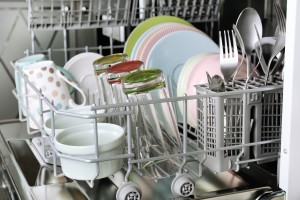Have you ever notice d when you are unloading your dishwasher some dishes, specifically plastic, are covered in beads of water? This may lead to you questioning how clean your dishes really are, or if something is wrong with your dishwasher. This problem is actually quite common when it comes to washing plastic in the dishwasher (which you should ensure your plastic dishware is dishwasher safe – a topic for a future blog.) Luckily, this problem can be explained by science, of course – because why else would we be discussing it?
d when you are unloading your dishwasher some dishes, specifically plastic, are covered in beads of water? This may lead to you questioning how clean your dishes really are, or if something is wrong with your dishwasher. This problem is actually quite common when it comes to washing plastic in the dishwasher (which you should ensure your plastic dishware is dishwasher safe – a topic for a future blog.) Luckily, this problem can be explained by science, of course – because why else would we be discussing it?
Conductivity
On average, a dishwasher will reach temperatures anywhere from 130 and 170 degrees Fahrenheit. Metal, glass, and plastic products all absorb heat at different rates, which impacts how quickly they can dry. Generally speaking, plastics are light weight materials, meaning they’re lighter and thinner than other options, and absorb less heat, making it difficult for water to evaporate. Another issue that can arise from lightweight plastics in dishwashers is they may move around, leaving you with plastic bowls or cups filled with water…and no one wants that!
Evaporation
The reason plastic dishes are more likely to have water on them post-wash than ceramic or glass pieces has to do with evaporation. Glass and ceramic dishes will stay hotter longer, meaning any water on the dish is likely to evaporate quicker than plastic dishes. Since plastic doesn’t get as hot as its counterparts, chances are more likely that water will condense on the surface.
Other considerations
It’s important to note that if you’re planning on washing plastic dishes, you should place them on the top rack. After all, water temperature is hotter on the bottom rack, and can warp or melt plastics (and no one wants that). Also, check the bottom of your containers to ensure they are BPA-free. When exposed to high temperatures, plastics containing BPA can leach out of a product and, if ingested, can pose potential health problems. If you have containers that aren’t listed as BPA-free, it may be your best bet to wash them by hand. So while there isn’t much advice we can offer on avoiding hand drying plastic dishes on occasion, you can always delegate that chore out to your significant other, roommates, or kiddos. After all, at the end of the day, who really likes washing dishes, anyways?
